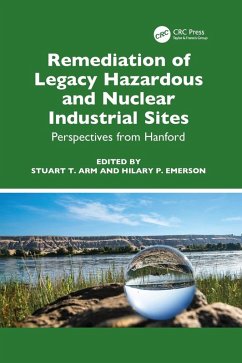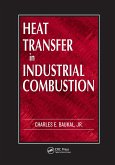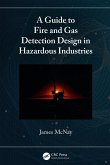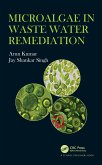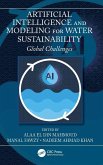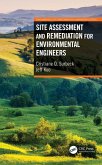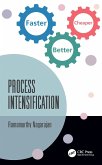Remediation of Legacy Hazardous and Nuclear Industrial Sites
Perspectives from Hanford
Herausgeber: Emerson, Hilary P.; Arm, Stuart T.
Remediation of Legacy Hazardous and Nuclear Industrial Sites
Perspectives from Hanford
Herausgeber: Emerson, Hilary P.; Arm, Stuart T.
- Gebundenes Buch
- Merkliste
- Auf die Merkliste
- Bewerten Bewerten
- Teilen
- Produkt teilen
- Produkterinnerung
- Produkterinnerung
The book provides an overview of the key elements involved in remediating complex waste sites using the Hanford nuclear site as a case study. The book is aimed at a non-technical audience and describes the stages of remediation based on RCRA/CERCLA processes, from site assessment to waste treatment and disposal and long-term monitoring.
Andere Kunden interessierten sich auch für
![Heat Transfer in Industrial Combustion Heat Transfer in Industrial Combustion]() Charles E. Baukal Jr.Heat Transfer in Industrial Combustion91,99 €
Charles E. Baukal Jr.Heat Transfer in Industrial Combustion91,99 €![A Guide to Fire and Gas Detection Design in Hazardous Industries A Guide to Fire and Gas Detection Design in Hazardous Industries]() James McNay (Fire Training Centre, Aberdeen, UK)A Guide to Fire and Gas Detection Design in Hazardous Industries102,99 €
James McNay (Fire Training Centre, Aberdeen, UK)A Guide to Fire and Gas Detection Design in Hazardous Industries102,99 €![Microalgae in Waste Water Remediation Microalgae in Waste Water Remediation]() Arun Kumar (India RCP Universe Group of Institutions)Microalgae in Waste Water Remediation255,99 €
Arun Kumar (India RCP Universe Group of Institutions)Microalgae in Waste Water Remediation255,99 €![Artificial Intelligence and Modeling for Water Sustainability Artificial Intelligence and Modeling for Water Sustainability]() Artificial Intelligence and Modeling for Water Sustainability177,99 €
Artificial Intelligence and Modeling for Water Sustainability177,99 €![Site Assessment and Remediation for Environmental Engineers Site Assessment and Remediation for Environmental Engineers]() Cristiane Q. SurbeckSite Assessment and Remediation for Environmental Engineers153,99 €
Cristiane Q. SurbeckSite Assessment and Remediation for Environmental Engineers153,99 €![Theoretical Insights into the Electrochemical Properties of Ionic Liquid Electrolytes in Lithium-Ion Batteries Theoretical Insights into the Electrochemical Properties of Ionic Liquid Electrolytes in Lithium-Ion Batteries]() Leila Maftoon-AzadTheoretical Insights into the Electrochemical Properties of Ionic Liquid Electrolytes in Lithium-Ion Batteries78,99 €
Leila Maftoon-AzadTheoretical Insights into the Electrochemical Properties of Ionic Liquid Electrolytes in Lithium-Ion Batteries78,99 €![Process Intensification Process Intensification]() Ramamurthy Nagarajan (IIT Madras Dept of Chemical Engineering)Process Intensification136,99 €
Ramamurthy Nagarajan (IIT Madras Dept of Chemical Engineering)Process Intensification136,99 €-
-
-
The book provides an overview of the key elements involved in remediating complex waste sites using the Hanford nuclear site as a case study. The book is aimed at a non-technical audience and describes the stages of remediation based on RCRA/CERCLA processes, from site assessment to waste treatment and disposal and long-term monitoring.
Hinweis: Dieser Artikel kann nur an eine deutsche Lieferadresse ausgeliefert werden.
Hinweis: Dieser Artikel kann nur an eine deutsche Lieferadresse ausgeliefert werden.
Produktdetails
- Produktdetails
- Verlag: Taylor & Francis Ltd
- Seitenzahl: 262
- Erscheinungstermin: 12. September 2024
- Englisch
- Abmessung: 182mm x 260mm x 20mm
- Gewicht: 740g
- ISBN-13: 9781032356723
- ISBN-10: 1032356723
- Artikelnr.: 70199933
- Herstellerkennzeichnung
- Libri GmbH
- Europaallee 1
- 36244 Bad Hersfeld
- gpsr@libri.de
- Verlag: Taylor & Francis Ltd
- Seitenzahl: 262
- Erscheinungstermin: 12. September 2024
- Englisch
- Abmessung: 182mm x 260mm x 20mm
- Gewicht: 740g
- ISBN-13: 9781032356723
- ISBN-10: 1032356723
- Artikelnr.: 70199933
- Herstellerkennzeichnung
- Libri GmbH
- Europaallee 1
- 36244 Bad Hersfeld
- gpsr@libri.de
Dr. Stuart T. Arm is a senior technical advisor who returned to Pacific Northwest National Laboratory (PNNL) in 2019 after 12 years working in industry. Dr. Arm holds a PhD and MEng in chemical engineering from Imperial College, London, and has 30 years' experience in national laboratories and the nuclear industry in the United Kingdom and the United States. He establishes PNNL and DOE strategic plans and objectives for radiochemical process flowsheets and technologies for treating and managing radioactive waste and commercial used nuclear fuel while acknowledging emerging national and international trends. Dr. Arm employs a collaborative and leading approach to technology and flowsheet maturation and integration to establish implementation strategies with multitechnical and organizational elements. Dr. Hilary P. Emerson's research focuses on the fate and remediation of radionuclides with experimental testing from the laboratory to the field scale. She holds a BS in Environmental Engineering (2009) from the University of Central Florida and a PhD in Environmental Engineering and Earth Science (2014) from Clemson University. Since joining Pacific Northwest National Laboratory in 2019, her work has focused primarily on the development of new remediation technologies for radionuclides and techniques for monitoring remediation technologies.
PART I Site Assessment and Characterization Stuart T. Arm and Hilary P. Emerson Chapter 1 Developing a Remediation Framework Katherine A. Muller, Courtney L. H. Bottenus, and Christian D. Johnson Chapter 2 Stakeholder Perspectives and Environmental Remediation Ellen Prendergast
Kennedy PART II Site Assessment and Characterization Christian D. Johnson, Katherine A. Muller, and Hilary P. Emerson Chapter 3 Characterization of a Uranium Groundwater Plume along the Columbia River Amanda R. Lawter and Michelle M.V. Snyder Chapter 4 Plutonium Finishing Plant Building and Subsurface Waste Release Characterization Calvin H. Delegard, Carolyn I. Pearce, Hilary P. Emerson, Andrea M. Hopkins, and Theodore J. Venetz Chapter 5 Tank Waste Characterization: History, Challenges, and Successes Emily Campbell, Carolyne Burns, and Richard Daniel Chapter 6 Waste Tank Structural Assessment Christopher Grant and Naveen Karri PART III Remedy Screening, Evaluation, and Testing Christian D. Johnson, Katherine A. Muller, and Hilary P. Emerson Chapter 7 Soil Desiccation Treatability Testing at BC Waste Disposal Cribs Adam R. Mangel and Christopher E. Strickland Chapter 8 Wasteform Development and Qualification for Tank Waste Vitrification and Disposal Jose Marcial and Derek Dixon Chapter 9 Plutonium Finishing Plant Demolition and Interim Subsurface Disposal Structure Stabilization Calvin H. Delegard, Carolyn I. Pearce, Hilary P. Emerson, Andrea M. Hopkins, and Theodore J. Venetz PART IV Remedial Action Christian D. Johnson, Katherine A. Muller, and Hilary P. Emerson Chapter 10 Groundwater Remediation with Pump
and
Treat Technology Sarah Saslow and Christian D. Johnson Chapter 11 Enhanced Attenuation of Uranium in the Subsurface Amanda R. Lawter and Michelle M.V. Snyder Chapter 12 Retrieval of Tank Waste from Storage Matthew Fountain and Beric Wells Chapter 13 Integrated Waste Treatment Flowsheet and Interface Management Strategy Jennifer A. Kadinger and Courtney L. H. Bottenus Chapter 14 Tank Waste Disposal R. Matthew Asmussen PART V Long
Term Stewardship and Future Land Use Vicky L. Freedman and Nicolas J. Huerta Chapter 15 End State: Vision for Future Land Use at Hanford Vicky L. Freedman and Nicolas J. Huerta Chapter 16 Afterword Nikolla P. Qafoku
Kennedy PART II Site Assessment and Characterization Christian D. Johnson, Katherine A. Muller, and Hilary P. Emerson Chapter 3 Characterization of a Uranium Groundwater Plume along the Columbia River Amanda R. Lawter and Michelle M.V. Snyder Chapter 4 Plutonium Finishing Plant Building and Subsurface Waste Release Characterization Calvin H. Delegard, Carolyn I. Pearce, Hilary P. Emerson, Andrea M. Hopkins, and Theodore J. Venetz Chapter 5 Tank Waste Characterization: History, Challenges, and Successes Emily Campbell, Carolyne Burns, and Richard Daniel Chapter 6 Waste Tank Structural Assessment Christopher Grant and Naveen Karri PART III Remedy Screening, Evaluation, and Testing Christian D. Johnson, Katherine A. Muller, and Hilary P. Emerson Chapter 7 Soil Desiccation Treatability Testing at BC Waste Disposal Cribs Adam R. Mangel and Christopher E. Strickland Chapter 8 Wasteform Development and Qualification for Tank Waste Vitrification and Disposal Jose Marcial and Derek Dixon Chapter 9 Plutonium Finishing Plant Demolition and Interim Subsurface Disposal Structure Stabilization Calvin H. Delegard, Carolyn I. Pearce, Hilary P. Emerson, Andrea M. Hopkins, and Theodore J. Venetz PART IV Remedial Action Christian D. Johnson, Katherine A. Muller, and Hilary P. Emerson Chapter 10 Groundwater Remediation with Pump
and
Treat Technology Sarah Saslow and Christian D. Johnson Chapter 11 Enhanced Attenuation of Uranium in the Subsurface Amanda R. Lawter and Michelle M.V. Snyder Chapter 12 Retrieval of Tank Waste from Storage Matthew Fountain and Beric Wells Chapter 13 Integrated Waste Treatment Flowsheet and Interface Management Strategy Jennifer A. Kadinger and Courtney L. H. Bottenus Chapter 14 Tank Waste Disposal R. Matthew Asmussen PART V Long
Term Stewardship and Future Land Use Vicky L. Freedman and Nicolas J. Huerta Chapter 15 End State: Vision for Future Land Use at Hanford Vicky L. Freedman and Nicolas J. Huerta Chapter 16 Afterword Nikolla P. Qafoku
PART I Site Assessment and Characterization Stuart T. Arm and Hilary P. Emerson Chapter 1 Developing a Remediation Framework Katherine A. Muller, Courtney L. H. Bottenus, and Christian D. Johnson Chapter 2 Stakeholder Perspectives and Environmental Remediation Ellen Prendergast
Kennedy PART II Site Assessment and Characterization Christian D. Johnson, Katherine A. Muller, and Hilary P. Emerson Chapter 3 Characterization of a Uranium Groundwater Plume along the Columbia River Amanda R. Lawter and Michelle M.V. Snyder Chapter 4 Plutonium Finishing Plant Building and Subsurface Waste Release Characterization Calvin H. Delegard, Carolyn I. Pearce, Hilary P. Emerson, Andrea M. Hopkins, and Theodore J. Venetz Chapter 5 Tank Waste Characterization: History, Challenges, and Successes Emily Campbell, Carolyne Burns, and Richard Daniel Chapter 6 Waste Tank Structural Assessment Christopher Grant and Naveen Karri PART III Remedy Screening, Evaluation, and Testing Christian D. Johnson, Katherine A. Muller, and Hilary P. Emerson Chapter 7 Soil Desiccation Treatability Testing at BC Waste Disposal Cribs Adam R. Mangel and Christopher E. Strickland Chapter 8 Wasteform Development and Qualification for Tank Waste Vitrification and Disposal Jose Marcial and Derek Dixon Chapter 9 Plutonium Finishing Plant Demolition and Interim Subsurface Disposal Structure Stabilization Calvin H. Delegard, Carolyn I. Pearce, Hilary P. Emerson, Andrea M. Hopkins, and Theodore J. Venetz PART IV Remedial Action Christian D. Johnson, Katherine A. Muller, and Hilary P. Emerson Chapter 10 Groundwater Remediation with Pump
and
Treat Technology Sarah Saslow and Christian D. Johnson Chapter 11 Enhanced Attenuation of Uranium in the Subsurface Amanda R. Lawter and Michelle M.V. Snyder Chapter 12 Retrieval of Tank Waste from Storage Matthew Fountain and Beric Wells Chapter 13 Integrated Waste Treatment Flowsheet and Interface Management Strategy Jennifer A. Kadinger and Courtney L. H. Bottenus Chapter 14 Tank Waste Disposal R. Matthew Asmussen PART V Long
Term Stewardship and Future Land Use Vicky L. Freedman and Nicolas J. Huerta Chapter 15 End State: Vision for Future Land Use at Hanford Vicky L. Freedman and Nicolas J. Huerta Chapter 16 Afterword Nikolla P. Qafoku
Kennedy PART II Site Assessment and Characterization Christian D. Johnson, Katherine A. Muller, and Hilary P. Emerson Chapter 3 Characterization of a Uranium Groundwater Plume along the Columbia River Amanda R. Lawter and Michelle M.V. Snyder Chapter 4 Plutonium Finishing Plant Building and Subsurface Waste Release Characterization Calvin H. Delegard, Carolyn I. Pearce, Hilary P. Emerson, Andrea M. Hopkins, and Theodore J. Venetz Chapter 5 Tank Waste Characterization: History, Challenges, and Successes Emily Campbell, Carolyne Burns, and Richard Daniel Chapter 6 Waste Tank Structural Assessment Christopher Grant and Naveen Karri PART III Remedy Screening, Evaluation, and Testing Christian D. Johnson, Katherine A. Muller, and Hilary P. Emerson Chapter 7 Soil Desiccation Treatability Testing at BC Waste Disposal Cribs Adam R. Mangel and Christopher E. Strickland Chapter 8 Wasteform Development and Qualification for Tank Waste Vitrification and Disposal Jose Marcial and Derek Dixon Chapter 9 Plutonium Finishing Plant Demolition and Interim Subsurface Disposal Structure Stabilization Calvin H. Delegard, Carolyn I. Pearce, Hilary P. Emerson, Andrea M. Hopkins, and Theodore J. Venetz PART IV Remedial Action Christian D. Johnson, Katherine A. Muller, and Hilary P. Emerson Chapter 10 Groundwater Remediation with Pump
and
Treat Technology Sarah Saslow and Christian D. Johnson Chapter 11 Enhanced Attenuation of Uranium in the Subsurface Amanda R. Lawter and Michelle M.V. Snyder Chapter 12 Retrieval of Tank Waste from Storage Matthew Fountain and Beric Wells Chapter 13 Integrated Waste Treatment Flowsheet and Interface Management Strategy Jennifer A. Kadinger and Courtney L. H. Bottenus Chapter 14 Tank Waste Disposal R. Matthew Asmussen PART V Long
Term Stewardship and Future Land Use Vicky L. Freedman and Nicolas J. Huerta Chapter 15 End State: Vision for Future Land Use at Hanford Vicky L. Freedman and Nicolas J. Huerta Chapter 16 Afterword Nikolla P. Qafoku

